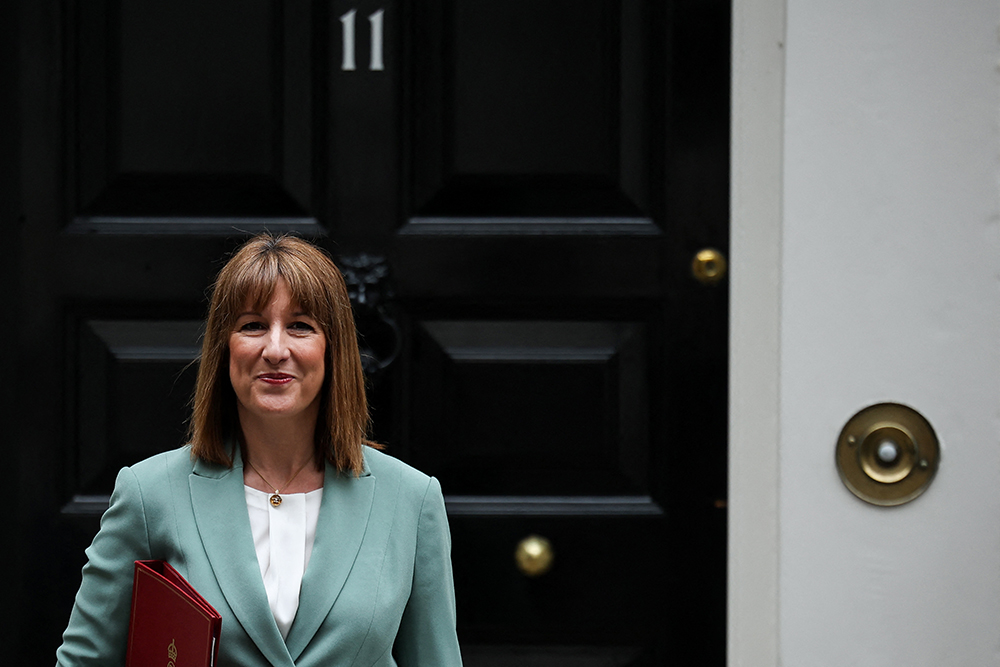
Gordon Brown may not be every teenager’s political pin-up. But as an Oxford student, Rachel Reeves proudly kept a framed photo of him in her bedroom. It was Brown who introduced the first multi-year spending review in 1998: the kind of big political set-piece speech which he relished. Reeves’s speech on Wednesday showed the level of constraints facing the Treasury this decade vs the 1990s.
Chess, not poker, is the Chancellor’s chosen game of recreation. As a player and a politician, she prides herself on making decisions guided by skill, care and thought. Yet this week she staked her government’s future on a series of political bets. Her tax rises and changes to Treasury rules gave her some £300 billion to spend across Whitehall – including £113 billion in capital funding. This is proof, her supporters say, that Reeves offers the kind of long-term thinking so absent under the Tories. But her exposure to risk means she is less ‘Iron Chancellor’, more ‘Iron Chancer’.
Her first bet is on the UK’s finances holding strong until October. Her fiscal headroom is just £9.9 billion, a buffer that could prove insufficient against further economic shocks. Domestic growth is sluggish and the global economy is set for its worst decade since the 1960s. Within the Treasury there are predictions of another nervy summer spent watching the bond markets. In the past year, UK ten-year gilt yields are now higher than after the Liz Truss ‘mini-Budget’ which the Chancellor so disdains. The high UK risk premium means yields have risen more than their equivalents in any other G7 country this year, bar Japan. Reeves is waging that the City views her plan as credible both now and when the OBR reports in the autumn. The bond markets need only be lucky once; she will have to be lucky always.
Then there is inflation, which is at 3.5 per cent. One aide involved in the last spending review, back in 2021, suggests the subsequent erosion of Whitehall budgets should serve as a ‘cautionary tale’ for ministers cheering this week. ‘Labour is running a looser policy. It just shows all of this is for naught if you don’t have a wider grip,’ they said.
Rachel Reeves has staked
her government’s future on
a series of political bets
Reeves’s second big bet is on health, the winner of the review. Wes Streeting’s department received a £29 billion rise in its day-to-day spending budget: 60 per cent of the cash increase available to Reeves. ‘If we don’t fix the NHS, we won’t win re-election’ is the argument Streeting made to the Treasury. More money, though, won’t guarantee results. As Paul Johnson, director of the Institute for Fiscal Studies – and one of Reeves’s favourite economists – noted this week, ‘very, very big increases’ in the number of doctors and nurses in NHS England between 2019 and 2024 yielded a ‘much smaller increase in measured activity’. On current trends, the health service will employ almost 10 per cent of England’s entire workforce within a decade. An ageing population will only increase its demands for state spending.
The third bet is on her party’s stomach for spending cuts. Citing the jump in spending from 2026/27 to 2028/29, Reeves told the House: ‘In place of chaos, I choose stability. In place of decline, I choose investment.’ But her words will give little encouragement to her backbenchers. Labour’s U-turn over the winter fuel payment, which dominated so much of the pre-review coverage, concerned just £1.2 billion (0.4 per cent of welfare spending) in a state that is projected to spend nearly £1.5 trillion by 2029.
While the Chancellor goes all in on public services, others are placing their bets elsewhere. Some senior Tories, jaded by their time in office, argue privately that Britain’s woes will be fixed only by an overhaul of Whitehall’s power structures. It is not just the post-Blair constitutional settlement that needs reversing, but the post-Brown Treasury set-up, too. While No. 10 and the Treasury slugged it out over the precise wording of Reeves’s speech on the day before the review, Richard Tice, Reform’s deputy leader, met 15 hedge fund leaders for breakfast. It was the kind of smoked salmon schmoozing that Reeves did in opposition not so long ago. ‘I think they call it a vibe shift,’ remarks one aide.

That change in the pace of politics is precisely why Labour MPs are urging the Chancellor to ‘get the money out the door as quickly as possible’. Colleagues cite Joe Biden’s failure to convince voters that they were better off under him, arguing that the British electorate must feel any benefits from new spending within the next year. Reeves can point to quick measures such as public sector pay increases and 500,000 more children getting free school meals. The £13.2 billion warm homes plan was ring-fenced, much to Ed Miliband’s delight, to try to bring down energy bills. Long-term infrastructure schemes, such as £14.2 billion for Sizewell C, have been balanced against £15.6 billion on local projects. Yet such was the level of concern about MPs’ reaction that Reeves began briefing them a full 24 hours before delivering her statement.
The Chancellor’s more generous colleagues recognise the immense strain she is under. Reeves must contend with two things that Brown’s Treasury never faced: a stuttering economy and the end of the Cold War peace dividend. Defence spending will rise to 2.6 per cent in April 2027. ‘Gordon never had to face a review like this,’ remarks one veteran, citing Brown’s persistent and vocal demands for Reeves to lift the two-child benefit cap. Another Labour MP notes that any political consensus tends to last 30 years: ‘We might now be coming to the end of the Third Way consensus.’
At cabinet, prior to heading to the Commons, Keir Starmer told ministers that the spending review ‘marks the end of the first phase of this government’. It was a remark intended to signal a line in the sand after a difficult first year in office. Yet if, as expected, Reeves hikes taxes again in the autumn, voters may struggle to see the difference.
The Chancellor’s figures rest on the hope that growth will be strong enough, inflation tame enough and tax receipts robust enough to last until October. Will her plan pay off? Don’t bet on it.








Comments